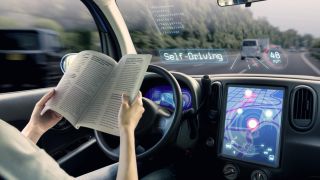Somebody’s Watching You: The Surveillance of Self-Driving Cars

Picture the future, where driving is a thing of the past. You can hop in your car or one from a ride-share, buckle up and tell the car where you want to go. During your ride, you can check your email and look up a few things online through your dashboard. Meanwhile, your whereabouts and other details are being tracked remotely by companies. As self-driving cars develop further, autonomous vehicles will play a much larger role in the digital economy as car companies and others harness personalized customer information through geospatial and navigation technologies, combining it with existing financial consumer profiles, according to a study in Surveillance and Society.
“Self-driving cars will represent a new mode for surveillance. Through a self-driving car’s global positioning, system, navigational tools, and other data collection mechanisms, companies will be able to gain access to highly contextual data about passengers’ habits, routines, movements, and preferences,” explained Luis F. Alvarez León, an assistant professor of geography at Dartmouth. “This trove of personal, locational, and financial data can be leveraged and monetized by companies, by providing a data-stream for companies to target customers through personalized advertising and marketing,” he added.
Today’s cars are already spatial multimedia environments that are highly computerized but self-driving cars will take this to a whole new level. They will also enable passengers to spend more time engaging with media in a vehicle. As the study point outs, this new economy may challenge notions of traditional car ownership, transforming “the car into a bundle of services rather than just a product.” Automobile manufacturers may essentially become digital platforms for media companies, search engines, retailers, vendors, and other companies, aiming to offer services to passengers through a car’s infotainment system.
The growth of self-driving cars will require more extensive communication networks, which will benefit ride-sharing companies, automobile manufacturers and other companies entering this new information-centric space.
“Through autonomous cars, the automotive and technology industries are likely to become more integrated with synergies across geospatial, navigation, artificial intelligence, ride-hailing, automotive and other industries and technologies,” said Alvarez Léon.
As self-driving car technologies develop, privacy and security concerns loom as to how companies will use personal data, an area for which the limits and specific governance mechanisms have yet to be defined by federal regulations.
*
Note to readers: please click the share buttons above or below. Forward this article to your email lists. Crosspost on your blog site, internet forums. etc.
Luis F. Alvarez León is available for comment at: [email protected].
Featured image is from TechRadar

